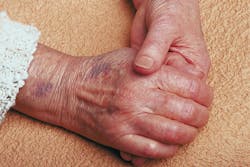Many of San Diego County Deputy District Attorney Paul Greenwood’s victims are unable to articulate their cases in front of a judge and jury. This would be a problem for a lot of prosecutors, but it doesn’t faze Greenwood. In fact, he encourages police investigators to bring him their most difficult cases of elder abuse, no matter how uncommunicative the victim or how sparse the evidence, because he knows that with some senior victims a few months can equal a lifetime. Greenwood heads San Diego’s Elder Abuse Prosecution Unit and, unfortunately, business is booming.
Although statistics on elder abuse remain sketchy, at least a million elderly Americans experience physical abuse each year. Another five million or more find themselves victims of fraud and financial abuse. That the numbers of known incidents do not come close to measuring the full reach of these crimes in the U.S. is indisputable: Many of the elderly do not or cannot report abuse incidents. The expanding ranks of older Americans, spurred on by the advancing years of the enormous Baby Boomer generation, has led the 60 and older population to increase 16.3 percent from the years 2000 to 2010. And each upper age category has shown a corresponding increase: Ages 65 and older have grown 12.4 percent, 70 and older has increased 9.0 percent and the number of individuals in the U.S. who are 85 and older has gone up by 1.5 percent.
Medical advances and a higher standard of living have contributed to the burgeoning American senior population, with indications those numbers will continue to rise. And as the population increases, so will the number of elderly victimized by nursing home personnel, caregivers, con artists and family members. Law enforcement agencies will need to up their games when it comes to investigating these increasingly more common crimes.
And that can prove problematic: Few agencies have units dedicated to cases involving this age group, but like child abuse and sexual assault, their successful investigation requires both specific training and specialized skill sets. The majority of officers are not equipped to handle elder abuse on a routine basis, and in most cases the types of training needed may not be locally available.
That has to change, Greenwood says. He’s spent over 16 years prosecuting these crimes, working for the past decade with a special investigative unit of the San Diego Police Department.
“These detectives know what to look for: They know how to freeze bank accounts, they know how to work with Adult Protective Services, procure medical records and confirm that an elderly person has a diagnosis of dementia or Alzheimer’s—all those things that help me as a prosecutor to go after the predator,” Greenwood says.
The Deputy D.A. instructs officers to refer cases to him immediately, even if they have a victim limited by mental capacity, rather than wait and build a case over time. It makes sense: The amount of time an elderly person has left to testify can sometimes be measured in weeks and months rather than years. And, says Greenwood, this applies whether the case involves physical or fiscal abuse.
Financial scams
Elder maltreatment, with its two distinct categories of crimes, remains unique from other avenues of abuse by requiring unique investigatory skills and resources to investigate. In addition to crimes against the person, ranging from neglect to assault, seniors find themselves increasingly victimized by financial swindles. These crimes commonly involve con artists or caretakers, however the most frequent culprit remains the senior’s own family.
Law enforcement officers see so much human depravity in their jobs that the idea a child would intentionally leave a parent destitute isn’t even a shocker. What is shocking is how common the experts think these cases are and how few perpetrators are caught and prosecuted. Kevin Schwartz of the California-based law firm Schwartz & Schwartz specializes in elder abuse litigation. Schwartz says that while there’s more general awareness of these crimes, “Many people still fail to appreciate how real the risks of financial elder abuse are to them. It’s always someone else’s family or friend at risk until it’s too late.”
Winsor Schmidt, J.D., L.L.M., and a professor of Family and Geriatric Medicine at the University of Louisville, says, “The increased risk of elder financial abuse by adult children is associated with such factors as the perpetrator’s unemployment, inability to drive and financial dependence upon the older person.” Schmidt adds that indicators of physical, emotional and sexual abuse are “more likely to have mental health and substance abuse problems.”
Schmidt also alleges both law enforcement and the judicial system are ill prepared to deal with an expected glut of elder abuse cases. He points out that with rare exception police, prosecutors, the courts and protective services agencies are all understaffed, undertrained and underfunded. With government continuing to suffer from lower tax revenues and higher expenses, these imbalances are not likely to right themselves any time soon.
Greenwood, the San Diego prosecutor, says investigators can make perfectly good criminal cases by looking at the totality of the evidence. Consider his example: The perpetrator of a paving scam enters the home of the elderly victim where the victim writes a large check. The perpetrator takes the check, does a small amount of work and leaves, never to return. Some officers would consider this a civil case, but Greenwood says not only is it a criminal matter, but investigators should file additional charges.
“I would consider this a residential burglary,” he says.
Protective behaviors
Paula Mixson, a certified guardian and the clerk of the National Committee for the Prevention of Elder Abuse (NCPEA), says many older adults find it difficult to reconcile the neglectful and abusive behaviors of their children with their views of themselves as parents. “The parent often sees the child’s behavior as a failure in their own parenting,” Mixson says, adding that it’s also common for parents to continue to want to protect the child, even though he or she may be abusive.
“The parent still feels a duty to protect and nourish the adult child. They aren’t willing or able to allow the child to face the consequences of his or her actions,” she says.
The advocate for older citizens and their safety points to a case in which an adult child pushed his mother down a staircase, but the victim refused to help the prosecution because she was afraid that if her son was unable to live with her he’d become homeless. She was more worried about his welfare than her own. And, because so many who are victimized simply don’t want to blow the whistle on their children, Mixson says it’s often up to a third party to contact police or APS.
Letter to NCPEA: I am a nurse and worked for a private care family. I believe there is financial and emotional abuse occurring within the home of a 70-year-old woman and 94-year-old woman. The daughter who lives next door and take (sic) all of the mother’s checks claiming that they shouldn’t be around caregivers, however, I found out that she was using her mother’s check books to pay for services such as the cleaning of her own home…
Many senior abuse victims dislike admitting they’ve been scammed, and that makes them prime targets for paving and roofing scams, Nigerian 419s and other con games. When they are conned, they don’t like to admit it and run the risk of appearing foolish. Schmidt of the University of Louisville says several common denominators exist among abuse victims.
“Low social support and previous traumatic event exposure (interpersonal and domestic violence) are the most consistent correlates of mistreatment across abuse types. High social support could help prevent abuse,” says Schmidt.
A team approach
Candace Heisler, a retired assistant district attorney from San Francisco and authority in the investigation of elder abuse cases, says one of the biggest errors any agency can make is in conducting unilateral investigations. Heisler advocates for the team approach.
“Law enforcement needs to meet their community partners, including Adult Protective Services, because there are resources that will assist them and their victims that are available in most communities. Law enforcement can’t do this alone, shouldn’t do this alone,” she says.
Heisler says there’s hope for increasing prosecution of elder abuse cases. “I see law enforcement participating on greater levels than ever before,” she says. But she believes that a community-based approach is necessary because both police and APS are dependent on others to report suspected cases of abuse.
She also notes that, although the general conception is that most cases of elder abuse are built around seniors who lack the capacity to report the abuse and/or defend themselves, this is not true in every case. While many victims are frail and suffer from forms of dementia, there are also victims who are capable of helping in the prosecution of their own cases.
When it comes to collecting enough evidence to prosecute, Heisler says officers and prosecutors must “take the time to gather it; we have to be good listeners; we have to approach the victim carefully, as we should with other kinds of victims, like domestic violence and sexual assault,” she says.
In a small, rural town, a woman in her 90s was found in bed, covered with open sores. Maggots had hatched in her wounds. She was filthy, undernourished and had not received her medication in months. Her caretaker was her son—a man in his 50s—who lived in her home and cashed her Social Security checks. When the woman was discovered, neighbors expressed amazement: They had not seen her in months, but thought she was simply too ill to be ambulatory.
Unfortunately, this scenario is common and, if predictions hold, incidents like this one will be something police will confront more and more often. Will they be prepared to handle the growing number of elder abuse cases? Placing more boots on the ground is probably not going to be an option for most agencies, so instead of beefing up the numbers of investigators handling these cases, it will be imperative for agencies to find ways to deal with them that are smarter and more efficient.
In addition to organizations like the NCPEA, other tools have been developed to investigate elder abuse cases. Here are some of them:
Elder Abuse Resource App (EARC) available on iTunes.
State by state clickable resources list:
http://www.ncea.aoa.gov/NCEAroot/Main_Site/Find_Help/State_Resources.aspx
Center on Elder Abuse and Neglect (various downloadable products:
http://www.centeronelderabuse.org/
ProPublica’s nursing home search tool:
About the Author

Carole Moore
A 12-year veteran of police work, Carole Moore has served in patrol, forensics, crime prevention and criminal investigations, and has extensive training in many law enforcement disciplines. She welcomes comments at [email protected].
She is the author of The Last Place You'd Look: True Stories of Missing Persons and the People Who Search for Them (Rowman & Littlefield, Spring 2011)
Carole can be contacted through the following:
- www.carolemoore.com
- Amazon author page: http://www.amazon.com/-/e/B004APO40S
